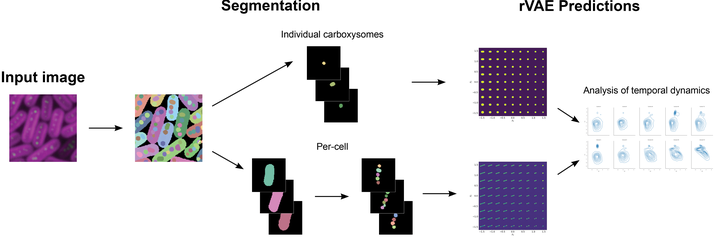Investigating Carboxysome Morphology Dynamics with a Rotationally Invariant Variational Autoencoder

Abstract
Carboxysomes are a class of bacterial microcompartments that form proteinaceous organelles within the cytoplasm of cyanobacteria and play a central role in photosynthetic metabolism by defining a cellular microenvironment permissive to CO 2 fixation. Critical aspects of the assembly of the carboxysomes remain relatively unknown, especially with regard to the dynamics of this microcompartment. We have recently expressed an exogenous protease as a way of gaining control over endogenous protein levels, including carboxysomal components, in the model cyanobacterium Synechococcous elongatus PCC 7942. By utilizing this system, proteins that compose the carboxysome can be tuned in real-time as a method to examine carboxysome dynamics. Yet, analysis of subtle changes in carboxysome morphology with microscopy remains a low-throughput and subjective process. Here we use deep learning techniques, specifically a Rotationally Invariant Variational Autoencoder (rVAE), to analyze the fluorescence microscopy images and quantitatively evaluate how carboxysome shell remodelling impacts trends in the morphology of the microcompartment over time. We find that rVAEs are able to assist in the quantitative evaluation of changes in carboxysome location, shape, and size over time. We propose that rVAEs may be a useful tool to accelerate the analysis of carboxysome assembly and dynamics in response to genetic or environmental perturbation, and may be more generally useful to probe regulatory processes involving a broader array of bacterial microcompartments.